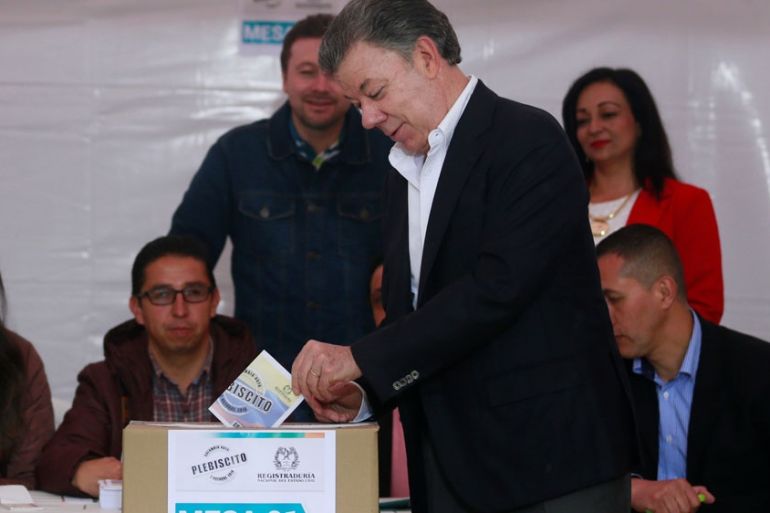Colombia referendum: Peace deal with FARC rejected
President Santos says ceasefire to remain in place as rebels also vow commitment to peace talks after shock vote result.

Voters in Colombia’s referendum have narrowly rejected a peace accord between the government and the Marxist group, FARC.
The outcome of Sunday’s vote endangers a deal expected to end 52 years of war and allow FARC fighters to re-enter society and form a political party.
Keep reading
list of 4 itemsColombia agrees with ELN rebel group to extend truce
Amid uptick in kidnappings, Colombian family receives ‘biggest gift of all’
Her son was killed by the Colombian military. Now, she’s getting an apology
With more than 99 percent of polling stations reporting, 50.2 percent of ballots opposed the accord while 49.8 percent favoured it – a difference of less than 60,000 votes out of a total of 13 million.
Al Jazeera’s Latin America Editor Lucia Newman, reporting from Bogota, called the vote result “very surprising” as every poll before the referendum had given the “yes” camp a lead.
President Juan Manuel Santos, who had promoted the “yes” campaign, said after results were announced that the bilateral ceasefire with FARC “is still in effect and should continue to be in effect”.
He said he would reach out to the country’s opposition leaders and had ordered government negotiators to return to Cuba on Monday to consult FARC leaders.
“I won’t give up. I’ll continue to search for peace until the last moment of my mandate,” he said.
FARC leader Rodrigo Londono said the group maintained its desire for peace despite the outcome of the referendum.
“The FARC reiterates its disposition to use only words as a weapon to build towards the future,” Londono, known by his nom de guerre, Timochenko, said. “To the Colombian people who dream of peace, count on us, peace will triumph.”
At the headquarters of the “yes” campaign, people were angry and in shock as results came in. Some were in tears while others chanted “we want peace”.
![A 'yes' supporter cries after hearing the referendum results [John Vizcaino/Reuters]](/wp-content/uploads/2016/10/b606f24b5a8845fc9c14fda1978ca530_18.jpeg)
The vote asked for a simple “yes” or “no” on whether Colombians support the accord signed last Monday by Santos, who has staked his legacy on peace, and Timochenko.
The peace accord, that took four years to negotiate, was applauded around the world.
“We must end a 52-year war and open the way to peace, a peace that will take us to a better future … peace is the way to ensure our children and grandchildren have a better country,” Santos said after voting.
Turnout in the referendum was low, less than the 40 percent seen in recent congressional elections and sign to some analysts that Colombians’ enthusiasm for implementing the accord is lacking.
The FARC, or the Revolutionary Armed Forces of Colombia, whose numbers were halved to about 7,000 in recent years because of a US-backed military offensive, has agreed to turn in weapons and fight for power at the ballot box instead of with bullets.
Influential former President Alvaro Uribe led the “no” camp, arguing that rebels should pay for crimes in jail and never be given congressional seats.
Angelika Rettberg, a political science professor at the University of Los Andes in Bogota, said the referendum outcome was consequence of “a profound dislike for President Santos” and of the impact years of human rights violations have had on public opinion.
She added that increasing security gains over the past 15 years have also made it hard for many to accept the concessions to the FARC that the peace agreement implies.
Voter Alejandro Jaramillo, 35, said he was angered that the rebels will not serve jail time.
“I voted no. I don’t want to teach my children that everything can be forgiven,” he said.
“The accord gives a lot of concessions to the guerrillas. They changed their strategy from arms to politics but the goal is still socialism,” said Javier Milanes, 34, a restaurant owner who also voted “no”.
The conflict has left an estimated 220,000 people dead and eight million displaced.
|
|